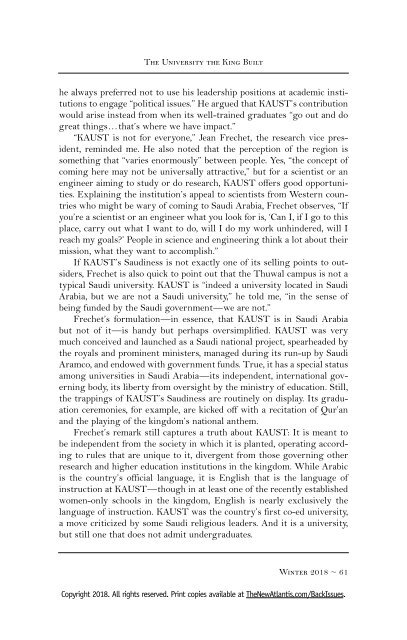The New Atlantis - Winter 2018 (Issue 54) uncompressed with cover
You also want an ePaper? Increase the reach of your titles
YUMPU automatically turns print PDFs into web optimized ePapers that Google loves.
<strong>The</strong> University the King Built<br />
he always preferred not to use his leadership positions at academic institutions<br />
to engage “political issues.” He argued that KAUST’s contribution<br />
would arise instead from when its well-trained graduates “go out and do<br />
great things...that’s where we have impact.”<br />
“KAUST is not for everyone,” Jean Frechet, the research vice president,<br />
reminded me. He also noted that the perception of the region is<br />
something that “varies enormously” between people. Yes, “the concept of<br />
coming here may not be universally attractive,” but for a scientist or an<br />
engineer aiming to study or do research, KAUST offers good opportunities.<br />
Explaining the institution’s appeal to scientists from Western countries<br />
who might be wary of coming to Saudi Arabia, Frechet observes, “If<br />
you’re a scientist or an engineer what you look for is, ‘Can I, if I go to this<br />
place, carry out what I want to do, will I do my work unhindered, will I<br />
reach my goals?’ People in science and engineering think a lot about their<br />
mission, what they want to accomplish.”<br />
If KAUST’s Saudiness is not exactly one of its selling points to outsiders,<br />
Frechet is also quick to point out that the Thuwal campus is not a<br />
typical Saudi university. KAUST is “indeed a university located in Saudi<br />
Arabia, but we are not a Saudi university,” he told me, “in the sense of<br />
being funded by the Saudi government — we are not.”<br />
Frechet’s formulation — in essence, that KAUST is in Saudi Arabia<br />
but not of it — is handy but perhaps oversimplified. KAUST was very<br />
much conceived and launched as a Saudi national project, spearheaded by<br />
the royals and prominent ministers, managed during its run-up by Saudi<br />
Aramco, and endowed <strong>with</strong> government funds. True, it has a special status<br />
among universities in Saudi Arabia — its independent, international governing<br />
body, its liberty from oversight by the ministry of education. Still,<br />
the trappings of KAUST’s Saudiness are routinely on display. Its graduation<br />
ceremonies, for example, are kicked off <strong>with</strong> a recitation of Qur’an<br />
and the playing of the kingdom’s national anthem.<br />
Frechet’s remark still captures a truth about KAUST: It is meant to<br />
be independent from the society in which it is planted, operating according<br />
to rules that are unique to it, divergent from those governing other<br />
research and higher education institutions in the kingdom. While Arabic<br />
is the country’s official language, it is English that is the language of<br />
instruction at KAUST — though in at least one of the recently established<br />
women-only schools in the kingdom, English is nearly exclusively the<br />
language of instruction. KAUST was the country’s first co-ed university,<br />
a move criticized by some Saudi religious leaders. And it is a university,<br />
but still one that does not admit undergraduates.<br />
<strong>Winter</strong> <strong>2018</strong> ~ 61<br />
Copyright <strong>2018</strong>. All rights reserved. Print copies available at <strong>The</strong><strong>New</strong><strong>Atlantis</strong>.com/Back<strong>Issue</strong>s.


